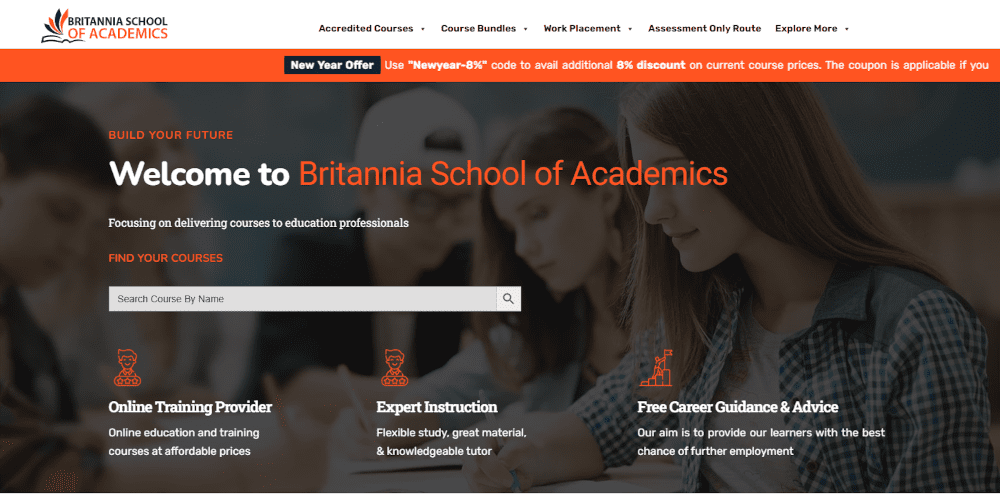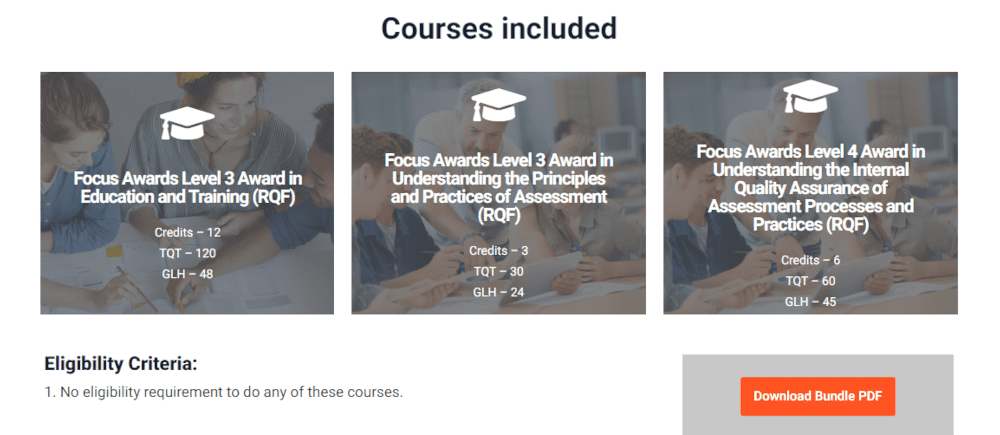Our content is reader supported, which means when you buy from links you click on, we may earn a commission.
How Iqbal Ahmad Started the Britannia School of Academics

- Who: Mr. Iqbal Ahmad
- Website: schoolofacademics.co.uk
- Course Topic: Education Professionals
- Interesting Stats: £15,000 of revenue/month
Who are you and what digital training company have you created?
I am the founder & CEO of Britannia School of Academics. I hold various teaching qualifications, including a Level 5 Diploma in Education and Training, and a Postgraduate Certificate in Learning and Teaching. I’ve been involved in training teaching professionals for over fifteen years and have mentored various educational leaders both within my organization and as a corporate trainer. I’m also honored to be a Senior Fellow of the Higher Education Academy (SFHEA).
I established this online school as a platform where new and experienced teaching professionals could gain accredited qualifications at affordable prices. The school is unique in the sense that it has something to offer education professionals of any designation, including teachers, trainers, teaching assistants, advisors, counselors, assessors, quality assurers, managers, and so on.
What market does your digital training serve?
Our courses are meant for education professionals working in a range of settings, including primary schools, secondary schools, sixth forms and colleges, independent training providers, and higher education providers.
 What’s the biggest benefit of taking your online courses?
What’s the biggest benefit of taking your online courses?
Our courses are fully accredited by OfQual and are well-respected within the education sector. These are delivered online in a fully automated fashion, whereby the learners study at the time and pace of their choice. As for the customer service and tutor support, our team members are available to help even during weekends and evenings. Therefore, the learners never feel left alone if they need urgent help outside the usual office hours.
How did you get into the market?
I came up with this idea during the lockdown of 2020. It was very clear to me that there was going to be a massive shift to online learning, which also presented a great opportunity to provide training for teachers and trainers working from home, as they now had more time to spend on their continuous professional development.
Why did you decide to create a digital training company?
A specialized digital training company for teaching professionals during the height of the Covid-19 pandemic ticked all the boxes for a potentially successful business idea. We now have approximately 600 learners, about half of whom are working from home, and so are able to spend more time to gain additional qualifications to improve their profiles than they would have been previously able to.
Did you have any moments of doubt before you launched your training company?
Being short of finance was certainly the biggest challenge when starting the Britannia School of Academics. To launch a digital training company requires a fair amount of investment, as there are a significant amount of resources that need to be prepared prior to launch. There were doubts about whether everything would in fact work out as intended. I financed this project mainly through personal debt, so I had put myself in a very dangerous position, should the project have failed for any reason. There were other struggles too, as with any complicated project, such as deciding on the best way to design the curriculum and deliver the courses.
What are your online courses like?
Our online courses are delivered through our Virtual Learning Environment (VLE) called Moodle. The courses start with a detailed induction video that contains helpful visuals. That way the learners are aware of how to navigate their way towards the completion of the course. They are then asked to do a quiz to evidence their understanding of the way the course will be delivered, to ensure they are ready to begin. On passing the quiz, they are granted access to the course resources.
We provide our learners with a range of study resources that help the learners to complete their courses, such as textbooks, written guides, guidance videos, video tutorials, and templates that they might require to use. A typical video lasts for 15-20 minutes. We are continuously reviewing, adding to, and improving our resources also based on feedback and internal reviews.
After gaining access to their study resources, the learner will then be ready to access their course units/modules. Should they face any issues during their course, they have access to 1-to-1 tutor support, which can take the form of messaging via Moodle, calling, or video conferencing (depending on their preference and the details of their query).

How long does it take you or your team to create a new course?
Even though I have a support team to help me with various processes, such as designing and branding our resources, the core of the work is carried out by myself. It takes me about 5-7 days to design the curriculum for a new course. I have a checklist of items that should be in place prior to launch, but each course is different and comes with its own challenges. The first step is to gauge demand for a new course. I then decide on the right combination of units, and the means to accredit/approve the course.
Once the above is in order, I start working on the study resources and the assessment plan for the course. When selecting the study resources, including the learning activities, I need to ensure that I consider the inclusive requirements of our learners, so that all learners have a fair opportunity to learn something and pass the course without hurdles.
The assessment plan explains how the course will be assessed, for example, through assignments, observations, and presentations. Finally, appropriate guides are written to answer any questions that the learners may have when studying for the course. The whole idea is to ensure that the course is automated so that the learner can study independently.
The final step is quality assurance, whereby two of my experienced colleagues review the entire course and identify possible improvements and corrections. Once that is actioned, the course is ready to be launched, and the marketing team gets in the action.
Tell us a little about the process of launching your first course and getting your first enrollment(s).
The first course that we launched was Level 3 Award in Education and Training, which mainly followed the same process as explained above. Since we did not have any market presence, we had to rely on Google Ads to enroll learners. Getting the first learner was a great feeling. It eliminated any doubts and fears we had when investing a lot of time and funds into the launch. Things actually proved to be slightly easier than we had anticipated. We were able to enroll substantial numbers of learners within the first month of our launch.
This is the link to the first course we launched.
Do you have a lead magnet?
We actually don’t have a lead magnet. As I explained previously, we never went into that struggling phase where we had to try out any such strategy. However, I am aware that a lot of providers do offer a free taster course in order to create a database of potential clients to whom they can market their paid courses.
What’s the traffic strategy that works best for you?
The most effective traffic strategy is Google Ads, as it attracts the bulk of our inquiries. We also rely on specialist course provider websites such as Reed Courses to direct potential leads to us. Moreover, our SEO department has done a great amount of work to ensure that we are ranked on the first page of Google for several of our courses, which brings us organic traffic. Lastly, we have now established some great connections with employers and education providers who consistently use us as their training provider, which is great to see.
What online course platform are you using?
I have used some of the best online platforms including Canvas, Ulearn, Smart Assessor, and Google Classroom. However, I have found Moodle to be the best option available in the market. That’s why Moodle is our choice of VLE.
Do you like it?
Our tutors and learners love Moodle.
Moodle is used by thousands of universities in the world and hundreds of thousands of SME training providers. There are countless plugins and themes created to enhance the Moodle experience. Most of them are available as free open-source documents. Moodle provides an easy and yet comprehensive solution to design and offer our courses to a range of learners.

Are there any features you wish it had?
Interactive learning features are missing on Moodle. We do use plugins such as H5P to fill that void, but these plugins also come with their limitations. I hope that an updated version of Moodle that offers such features is launched soon.
What made you decide to use your chosen platform over others?
As explained above, thousands of universities around the world relying on Moodle was testament enough that it would handle the large number of learners we were anticipating to enroll. Furthermore, it’s a free open-source portal. It allows for a great deal of integration with other plugins, making it an ‘Android’ of online portals. Thus far, it has delivered on its promises, and we are very happy to have made this choice.
What other tools do you use to run your digital training business?
We use Mouseflow to track the movement of the traffic on our website to understand the users’ behavior so that we can make improvements to our website.
We use Bitrix24 to manage our website live chats, inquiries forms, and applications, and to track our customers from ‘leads’ all the way to ‘enrolled learners’. It’s a very good CRM and operations management system that we are glad to have selected.
We use Animator to create interesting animations for our learners, with the use of whiteboard animation. These videos are much appreciated by our tutors and learners.
What books or training programs have you found useful on your journey to a successful business owner that others might find valuable too?
I have gained the following qualifications that have helped me a great deal in launching and successfully running this project: the Level 3 Certificate in Assessing Vocational Achievement; Level 4 Certificate in Leading the Internal Quality Assurance of Assessment, Level 5 Diploma in Education and Training, and Postgraduate Certificate in Learning and Teaching in the Higher Education.
Furthermore, it’s always helpful to watch relevant YouTube tutorials if you need help with anything. We live in an incredible time with a vast amount of information at our fingertips. A lot which could also be used as study resources.

Do you have any big mistakes you’ve made along the way that you’d be willing to share?
I made the mistake of launching courses without proper market research. This led to a lot of time and funds being wasted, with little or no interest from potential learners. - Iqbal Ahmad Click To TweetHowever, this mistake was not fatal and helped to inform our decisions from then on. The key point to remember for me is to never launch a course simply because I would have bought it, but to ensure that others concur with me.
Please share some idea of revenue for your digital training company.
We currently have about 100 new admissions every month, generating around £15,000 of revenue each month.
Please tell us a little about what the money you’ve earned from running your digital training company has done for you.
I am using half of our cash surplus to pay off the loans that I used to finance the project. The other half is being reinvested back into the business to expand our team and to launch new courses. I am also hoping to take a long-overdue break with my family during Summer 2022. This will be a great breath of fresh air after working hard all through the lockdown.
In addition to revenue are there any numbers you would like to share?
We have approximately 6,000 new visitors to our website every month. Around 600 of these visitors register interest in doing one of our courses. Around 100 actually then proceed to start a course. Our Trustpilot Reviews average around 4.5/5, which is an unusually high rating in our industry.
What has creating your digital training business done for you personally?
Attaining this much success over such a short period of time has given me confidence that I never thought I would have. I am also able to see my true potential and hence able to plan for large-scale expansion. - Iqbal Ahmad Click To TweetWe are working on launching an awarding organization by Summer 2022. That would be accrediting courses offered by other training providers like ourselves. I am also in contact with various universities for collaboration arrangements. None of this was even imaginable a couple of years ago.
What advice do you have for people just starting out?
I strongly advise anyone looking to launch their own course to have a very good understanding of the market you wish to serve. You want to know the needs and demands of your potential client, and to do extensive market research into your proposed course. It’s very easy to get carried away and be optimistic about how successful your course is going to be. One of the many ways in which the market research could be conducted is to use Keyword Planner on Google Ads to look at some key statistics on how often people search for courses similar to the ones you aim to design and offer.
Qualifications …
Secondly, I cannot stress the importance of having appropriate qualifications and experiences in course designing. Courses are usually split into units/modules, with each module having different learning outcomes. Each learning outcome is then assessed through a range of assessment criteria. In order to make sure that your learners can pass each assessment criteria, you should design a curriculum comprising a range of topics to be taught. You should outline exactly how you wish to teach those. Schemes of work are then prepared, followed by lesson plans for each of the lessons that you aim to deliver. The actual delivery only just starts from this point onwards.
There are a lot of technicalities involved in the above. If you do not have a recognized teaching qualification, alongside some experience in carrying out the above tasks, chances are that you will end up creating a course that would be much too confusing and ill-structured, and perhaps even fail to deliver on the promises that you had made to your clients. Therefore, make sure that you gain appropriate qualifications and experience before embarking on a journey to design new courses. If you do not already have that experience, collaborate with someone who does (at least for the first few projects) until you are confident to launch a solo project.